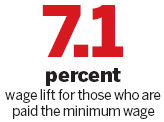HK$30 wage baseline gets govt green light
Updated: 2012-12-13 07:45
By Kahon Chan and Fan Feifei(HK Edition)
|
|||||||||

Businesses, however, complain of rising costs, serious labor shortage
The city will raise its minimum hourly wage from HK$28 to HK$30 beginning May 1, but businesses are saying a serious labor shortage has already pushed up wages and they're struggling to find employees.
The increased minimum wage advanced by the Minimum Wage Commission was approved on Wednesday by the Chief Executive and the Executive Council, raising the statutory minimum wage by HK$2 or 7.1 percent.
The announcement was made by Matthew Cheung Kin-chung, secretary for Labour and Welfare. He said the administration fully adopted the recommendation of the commission because it was seen to be reasonable and balanced.
A security guard, named Cheung, said he thought the raise was acceptable, "but I think HK$32 would be better, since food costs, housing expenses and other costs are rising." On the other hand, the owner of an electrical repair store said the increased minimum wage will have no effect on him. He was forced to let all his employees go because of the rising rents for commercial properties.
The Census and Statistics Department, based on an earlier survey, said it expected 327,200 workers will benefit from the two-dollar raise.
After taking into account the trend of pay rises up to mid 2012, however, the worker pool that is paid the minimum wage has shrunk to 223,100, representing about 7.9 percent of the city's workforce.
Matthew Cheung maintained that the figures are a positive sign, since fewer workers are falling onto the safety net, "it is good that the wage is going up," he summed up.
However, Tommy Cheung Yu-yan, a lawmaker of Liberal Party representing the catering sector, described the raise as "unreasonable" when the economy is verging on recession.
"This aggressive move is not helping the overall society, especially small and medium businesses," said Cheung. "It is adding to the burden on top of the prevailing labor shortage."
The report submitted by the Minimum Wage Commission predicted that about 10,500 workers will lose their jobs under normal economic conditions because of the two-dollar raise.
But in reality, various sector representatives told China Daily that they were forced to increase wages in an ongoing fight among employers over the shrinking labor pool.
Restaurateur Yeung Wai-sing, who also chairs the Association of Hong Kong Catering Services Management, said though jobs in the catering business are subject to a tough working environment, they had once been attractive for the better pay and free meals they offer.
But the minimum wage policy, enforced in 2011, has closed that advantage, he contended.
A dishwasher in a residential area now gets over HK$40 per hour - and as job seekers can find jobs close to home, the same position downtown in Causeway Bay or Tsim Sha Tsui would cost an employer HK$60 an hour.
"The minimum wage has become meaningless to the catering sector now," said Yeung. "Positions are all open with no one to fill in."
The change of dynamics in the labor market also hurt operators of mini-buses. Lai Ming-hung, chairman of the Taxi & Public Light Bus Concern Group, said the red and green minibuses are suffering from driver shortfalls of about 30 percent since the minimum wage was enacted.
Drivers of green minibuses are still paid about HK$10,000 a month, though the work is demanding. Lai said prospective candidates have turned to less demanding jobs such as estate security officer.
"People were willing to take the driver's seat when the wage gap was HK$6,000. But when that gap is narrowed to just HK$1,000 following the minimum wage, they are reluctant to drive. They just want to sit," said Lai.
Lai himself, however, is an advocate of the minimum wage and he blamed the "unscrupulous employers" for setting the wage too low in the past. He said the sector will try to boost payments to drivers, but district councillors must also accept fare hikes to fund that raise.
Catherine Yan Shui-han, convener of the Environmental Services Contractors Alliance, said about 30 percent of cleaning workers would be affected by the two-dollar raise, but she also described the labor shortage as the top challenge the industry faces.
The impact of the increase of minimum wage would be relatively indirect by comparison. It might favor employees in their wage negotiations, she suggested, and the resulting inflation would push up costs across the board.
Unions have been demanding a raise to HK$33 or HK$35. Wong Kwok-hing of Hong Kong Federation of Trade Unions was disappointed by the two-dollar raise, but he thinks the negotiation effort between the labor and employers deserve credits for the outcome.
Poon Man-hon, spokesperson for the People's Alliance for the Minimum Wage, said it was no surprise that the administration endorsed the consensus reached between all parties, but he noted that the government actually has a good grip of the negotiations because of the system design.
For now, the unions are funneling their pressure to demand an annual review of the baseline salary. The decision was not made and Jat Sew-tong, chairperson of the Minimum Wage Commission, said the current law is open to an annual review.
The Minimum Wage Ordinance (Amendment of Schedule 3) Notice 2012 will be published in the Government Gazette on Friday and tabled in the Legislative Council (LegCo) next Wednesday. The LegCo has no power to amend the rate of adjustment though.
You may contact the writers through kahon@chinadailyhk.com
(HK Edition 12/13/2012 page1)